
Vladimir Vladimirovich Putin is a Russian politician and former intelligence officer who is the president of Russia. Putin has held continuous positions as president or prime minister since 1999: as prime minister from 1999 to 2000 and from 2008 to 2012, and as president from 2000 to 2008 and since 2012. He is the longest-serving Russian or Soviet leader since Joseph Stalin.

Mikhail Borisovich Khodorkovsky, sometimes known by his initials MBK, is an exiled Russian businessman, oligarch, and opposition activist, now residing in London. In 2003, Khodorkovsky was believed to be the wealthiest man in Russia, with a fortune estimated to be worth $15 billion, and was ranked 16th on Forbes list of billionaires. He had worked his way up the Komsomol apparatus, during the Soviet years, and started several businesses during the period of glasnost and perestroika in the late 1980s. In 1989, he became Chairman of the Board of Bank Menatep, which he founded. After the dissolution of the Soviet Union, in the mid-1990s, he accumulated considerable wealth by obtaining control of a number of Siberian oil fields unified under the name Yukos, one of the major companies to emerge from the privatization of state assets during the 1990s.

Aleksandr Gelyevich Dugin is a Russian far-right political philosopher.
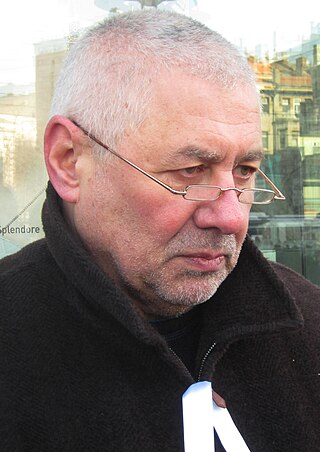
Gleb Olegovich Pavlovsky was a Russian political scientist who also described himself as a "political technologist". During the Soviet era, he was prosecuted as a dissident. From 1996 to 2011, he was a political adviser to Vladimir Putin. Since then, he was a critic of the Russian government.

Vladimir Georgiyevich Sorokin is a contemporary postmodern Russian writer of novels, short stories, and plays. He has been described as one of the most popular writers in modern Russian literature.
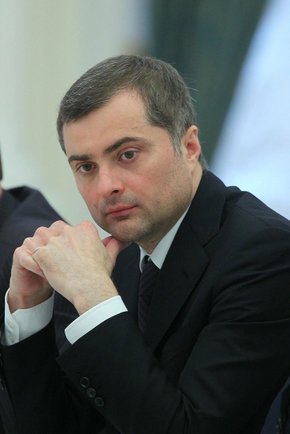
Vladislav Yuryevich Surkov is a Russian politician and businessman. He was First Deputy Chief of the Russian Presidential Administration from 1999 to 2011, during which time he was often viewed as the main ideologist of the Kremlin who proposed and implemented the concept of sovereign democracy in Russia. From December 2011 until May 2013, Surkov served as the Russian Federation's Deputy Prime Minister. After his resignation, Surkov returned to the Presidential Executive Office and became a personal adviser of Vladimir Putin on relationships with Abkhazia, South Ossetia and Ukraine. He was removed from this duty by presidential order in February 2020.
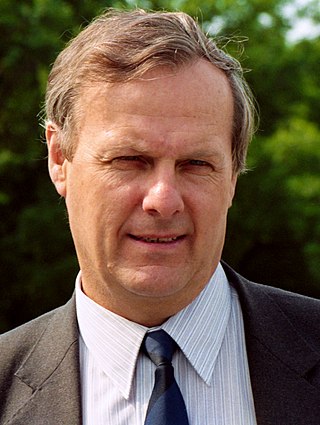
Anatoly Aleksandrovich Sobchak was a Russian politician, a co-author of the Constitution of the Russian Federation, the first democratically elected mayor of Saint Petersburg. He is known to be the mentor of Vladimir Putin and Dmitry Medvedev.
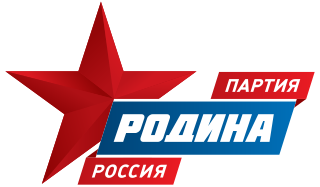
The All-Russian Political Party "Rodina" is a nationalist political party in Russia. It was a coalition of thirty nationalist groups that was established by Dmitry Rogozin, Sergey Glazyev, Sergey Baburin, Viktor Gerashchenko, Georgy Shpak, Valentin Varennikov and others in August 2003. The party's ideology combines "patriotism, nationalism, and a greater role for the government in the economy", and is described as pro-Kremlin. Its headquarters is located in Moscow.
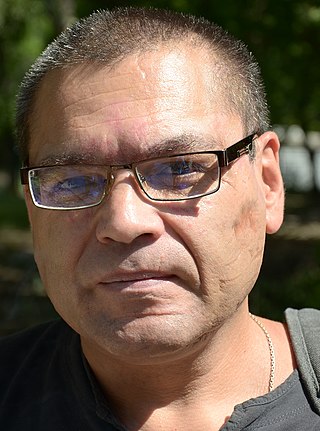
Andrei Maratovich Babitsky was a Russian journalist and war reporter, who worked for Radio Free Europe/Radio Liberty (RFE/RL) from 1989 to 2014, covering the 1991 August Coup, Civil War in Tajikistan and both the First and Second Chechen Wars from behind Chechen lines. Babitsky's kidnapping by the Russian forces in January–February 2000 during the Second Chechen War attracted attention of international journalists' organisations. His 2005 video interview with Chechen warlord Shamil Basayev was condemned by Russian government, as Basayev was on wanted terrorist list in Russia.
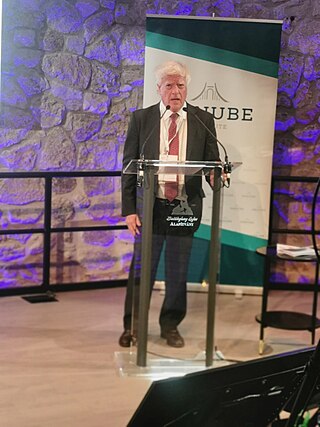
David A. Satter is an American journalist and historian who writes about Russia and the Soviet Union. He has authored books and articles about the decline and fall of the Soviet Union and the rise of post-Soviet Russia. Satter was expelled from Russia by the government in 2013. He is perhaps best known as the first researcher who claimed that Vladimir Putin and Russia's Federal Security Service were behind the 1999 Russian apartment bombings and is particularly critical of Putin's rise to the Russian presidency.
Vladimir Valerianovich Pribylovsky was a Soviet and Russian political scientist, historian, journalist, human rights activist, and author of internet database Anticompromat.org on biographies of Russian politicians. He also authored more than 40 books.

Masha Gessen is a Russian-American journalist, author, translator. Gessen is nonbinary and trans and uses they/them pronouns. Gessen has written extensively on LGBT rights.

Luke Daniel Harding is a British journalist who is a foreign correspondent for The Guardian. He is known for his coverage of Russia under Vladimir Putin, WikiLeaks and Edward Snowden.

The Russian presidential inauguration is a ceremony to mark the start of a term of the president of Russia. The president's term is six years. In the case of extraordinary election, the inauguration is conducted thirty days after the announcement of the official election results by the Central Election Commission of Russia. Since Vladimir Putin's first inauguration in 2000, the ceremony took place in the Grand Kremlin Palace of the Moscow Kremlin. The inauguration ceremony of the Russian president has traditionally been accompanied by the festive prayer service of the Patriarch of Moscow and all Rus', which dates back to 1498, when the first wedding took place for the reign of Prince Dmitry Ivanovich, the grandson of Ivan III.

The public image of Vladimir Putin concerns the image of Vladimir Putin, President of Russia, among residents of Russia and worldwide. According to the Russian non-governmental organization Levada Center, about 85% of the Russian population approved of Putin in the beginning of 2023, the highest in nearly 8 years.

Mikhail Viktorovich Zygar is a Russian born journalist, writer and filmmaker, and the founding editor-in-chief of Russian news channel TV Rain (2010–2015). Under Zygar's leadership, TV Rain provided an alternative to Kremlin-controlled federal TV channels by focusing on news content and giving a platform to opposition voices. The channel's coverage of politically sensitive issues, like the Moscow street protests in 2011 and 2012 as well as the conflict in Ukraine, has been dramatically different from the official coverage by Russia's national television stations. Zygar is also the author of the book All the Kremlin's Men (2017), the history of Putin's Russia, based on interviews with Russian politicians from Putin's inner circle.

Putinism is the social, political, and economic system of Russia formed during the political leadership of Vladimir Putin. It is characterized by the concentration of political and financial powers in the hands of "siloviks", current and former "people with shoulder marks", coming from a total of 22 governmental enforcement agencies, the majority of them being the Federal Security Service (FSB), Ministry of Internal Affairs of Russia, Armed Forces of Russia, and National Guard of Russia. According to Arnold Beichman, "Putinism in the 21st century has become as significant a watchword as Stalinism was in the 20th."

The first inauguration of Vladimir Putin as the president of Russia took place on Sunday, May 7, 2000. The ceremony was held for the first time in the Grand Kremlin Palace and lasted exactly one hour.
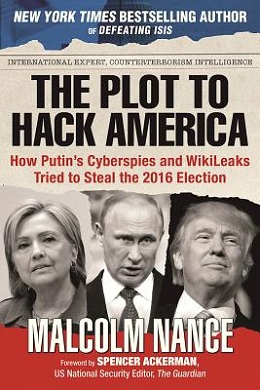
The Plot to Hack America: How Putin's Cyberspies and WikiLeaks Tried to Steal the 2016 Election is a non-fiction book by Malcolm Nance about the Russian interference in the 2016 United States elections. It was published in paperback, audiobook, and e-book formats in 2016 by Skyhorse Publishing. A second edition was also published the same year, and a third edition in 2017. Nance researched Russian intelligence, working as a Russian interpreter and studying KGB history.
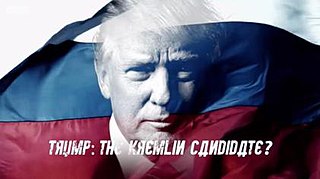
Trump: The Kremlin Candidate? is a documentary film first broadcast by the program Panorama on BBC One, and first aired in the United Kingdom on 16 January 2017, four days before the Inauguration of Donald Trump. It examined links between Trump associates and Russian officials and spies and the relationship between Vladimir Putin and Donald Trump. It features investigative journalist John Sweeney, who journeyed to Russia, Ukraine, Lithuania, and the United States during the course of his research. Sweeney had prior experience on the subject matter, having interviewed Trump in 2013, and Putin in 2014. The film was directed by Matthew Hill, Tomiko Newson, and Nick Sturdee.



















